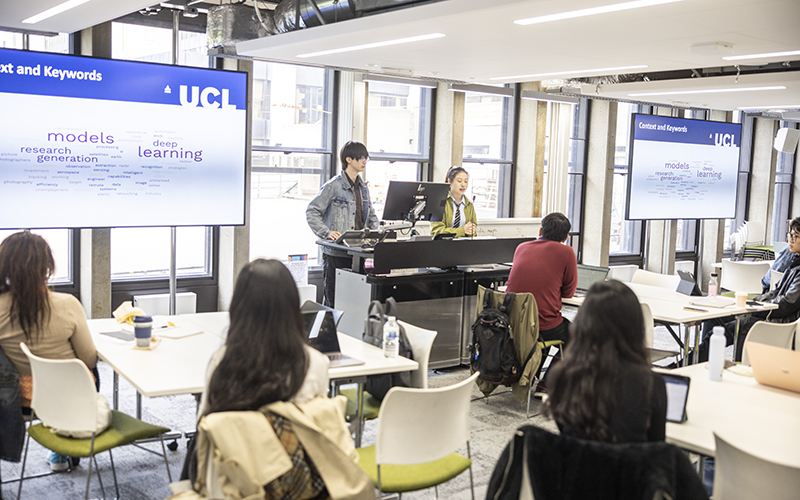‘What are the Social Sciences?’: Exploring something new from an interdisciplinary perspective
By IOE Blog Editor, on 29 June 2023

Image credit: Mat Wright for UCL IOE.
29 June 2023
By Ziqi Huang, Social Sciences BSc (class of 2023)
The Social Sciences BSc programme appeared as something similar to Sociology three years ago, when I was applying for my undergraduate study. It was a while after I began my study at IOE when it occurred to me that this title often seems strange to others. As I was discussing my future plans with a senior student one day, she commented in surprise, ‘You study Social Sciences? What programme is that?’
I tried to explain that it was close to Sociology. ‘But it is not Sociology, right? It sounds like your modules include a lot more than Sociology, and it’s a bit… confusing.’
She was not wrong. As Social Sciences BSc students, we had the opportunity to choose from a variety of modules that wouldn’t appear in a Sociology programme. I learned Psychology, Social Psychology, Anthropology, game theories, and even a bit of Criminology. It would be difficult for a Social Sciences student to summarise what they have learned over the years in one word. Surely, some see it as a disadvantage, as it feels like the programme has no clear focus and is therefore, ‘confusing’.
At the time, I felt more or less disturbed by this idea – that my programme was too broad and not focused enough. The turning point emerged this year, as I started to work on my undergraduate dissertation.
Through my learning experiences regarding both Sociology and Psychology, I developed an interest in exploring mental health from a sociological perspective. Especially as an international student, I took the opportunity to try exploring something that I had long been curious about: What do parents think of young people’s mental health in an East Asian context? This was at first more of a personal question, as some of my friends suffering from mental health problems were deeply troubled by their family relationships. On social media, a number of young people from East Asia also believed that their mental health problems were rooted in the parent-child relationship and that the recovery process could be disrupted by problematic family relationships. How does family, especially one’s parents, affect young people’s mental health in a unique way within this context? Although I was not entirely sure that the topic of mental health fit into the sociological discipline, it suddenly occurred to me that the Social Sciences programme provided a perfect opportunity to explore this problem.
Thus, I conducted an online questionnaire for parents with open-ended questions, aiming to understand parents’ thoughts in relation to East Asian culture. What I had not expected though, was that during my analysis, the sociological theories that I had in mind gradually became insufficient in explaining the participants’ responses. In the end, increasingly various concepts and theories from Sociology, Psychology, as well as Social Psychology, had to be drawn and added to my work to fully understand parents’ ideas. In fact, it surprised me that there was so much to say as a result of such an interdisciplinary approach. I even had a hard time deciding which arguments were the most important ones.
One participant later contacted me and expressed gratitude, saying that the questionnaire made him think a lot. A fellow student, after hearing about my dissertation topic, laughed and said, ‘Your topic’s really something. That’s definitely what a lot of young people want to know about.’ Short comments like these overwhelmed me, as my dissertation appeared to me as merely an assignment only a few months ago. I had not expected that it would actually help someone or make a difference, even a tiny one. Reflecting on my journey of researching and exploring, I realised that all of these would not have been possible without my interdisciplinary background. I would not have developed such a research question if I had not spent time learning about both Psychology and Sociology. Moreover, I would not have noticed the influences of an indigenous setting if I had not been trained in a sociological way. Meanwhile, I would not have questioned the differences between psychological definitions and public perceptions of mental health if I had not been able to get in touch with traditional Psychology.
Upon submitting the dissertation, I could not help asking my supervisor the question that I had long been thinking about, ‘Where does my research belong? It feels like it’s not entirely Sociology, or Psychology, or Social Psychology. Is it confusing?’
‘I think it’s in the exact right place already, Social Sciences,’ he replied without hesitation.
While rigorous training within a specific discipline is often valued, I believe that an interdisciplinary approach offered by the Social Sciences BSc at IOE provides a unique opportunity to produce unexpected research findings. This ‘strange’ programme allows its students the freedom to develop ‘strange’ topics from the beginning, as we have never been restricted to considering social issues from a singular perspective. What I considered as a disadvantage may eventually turn out to be an edge, an insight that inspires me to continue exploring society in a new way.
 Close
Close


